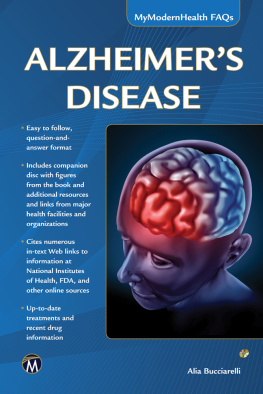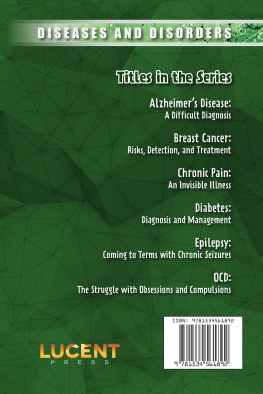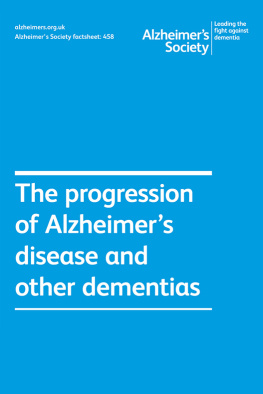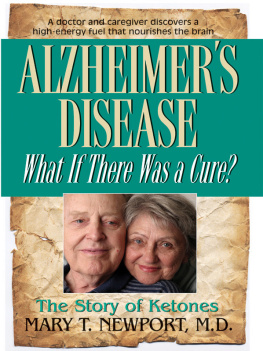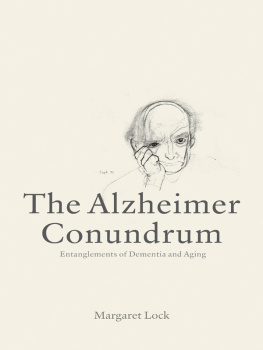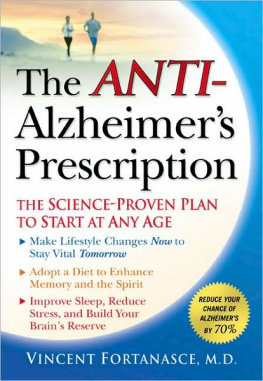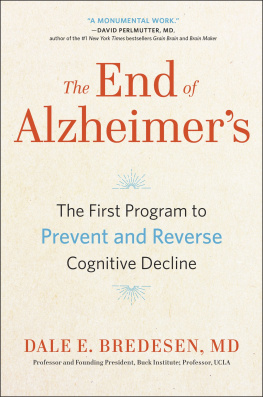Alia Bucciarelli - Alzheimer’s Disease
Here you can read online Alia Bucciarelli - Alzheimer’s Disease full text of the book (entire story) in english for free. Download pdf and epub, get meaning, cover and reviews about this ebook. year: 2016, publisher: Mercury Learning and Information LLC., genre: Romance novel. Description of the work, (preface) as well as reviews are available. Best literature library LitArk.com created for fans of good reading and offers a wide selection of genres:
Romance novel
Science fiction
Adventure
Detective
Science
History
Home and family
Prose
Art
Politics
Computer
Non-fiction
Religion
Business
Children
Humor
Choose a favorite category and find really read worthwhile books. Enjoy immersion in the world of imagination, feel the emotions of the characters or learn something new for yourself, make an fascinating discovery.
- Book:Alzheimer’s Disease
- Author:
- Publisher:Mercury Learning and Information LLC.
- Genre:
- Year:2016
- Rating:3 / 5
- Favourites:Add to favourites
- Your mark:
- 60
- 1
- 2
- 3
- 4
- 5
Alzheimer’s Disease: summary, description and annotation
We offer to read an annotation, description, summary or preface (depends on what the author of the book "Alzheimer’s Disease" wrote himself). If you haven't found the necessary information about the book — write in the comments, we will try to find it.
Alzheimer’s Disease — read online for free the complete book (whole text) full work
Below is the text of the book, divided by pages. System saving the place of the last page read, allows you to conveniently read the book "Alzheimer’s Disease" online for free, without having to search again every time where you left off. Put a bookmark, and you can go to the page where you finished reading at any time.
Font size:
Interval:
Bookmark:
Several people contributed directly or indirectly to this book. I sincerely thank Jenny Figueroa and Lavonne Beckford for sharing their caregiving experiences with me with candor and grace; it is their mother, Violet, upon whom the opening vignettes are based. I also thank Madeline Siedler, who provided me research and writing support, for which I am grateful. Finally, I thank my husband and children for their love.
Chapter Opener Figure Credits
- Cerebral lobes by derivative work of this - Gutenberg Encyclopedia.
Licensed under CC BY-SA 3.0 via Wikimedia Commons
) - Own work. Licensed under Public
Domain via Wikimedia Commons
- License CC0 Public Domain
- by Daniel Sone (Photographer)
- by Ray Nata - Own work. Licensed under GFDL via Wikimedia Commons
- by Sigismund von Dobschtz - Own work. Licensed under CC BY-SA 3.0 via
Wikimedia Commons
- by I Craig from Glasgow, Scotland - Birthday Cake
- by Department of Foreign Affairs and Trade -Operation Open Heart.
Licensed under CC BY 2.0 via Wikimedia Commons
- by Alex Proimos from Sydney, Australia - The Fountain of Youth.
Licensed under CC BY 2.0 via Wikimedia Commons
CHAPTER |  |
In the evenings, after the desert heat had dissipated but before the sun had set, you could find Violet gardening in her front yard. Wife, mother of four, and grandmother of 6, Violet could coax the plum tree in the center of her yard into bloom despite the Arizona desert climate. She always had a story or joke to share with the neighbors and was the first person they would ask about the local goings-on. When she wasnt gardening, she was babysitting her grandkids, helping them with their homework, and cooking them food from her native Jamaica.
It wasnt long after she turned 73 that Violet began to become forgetful. Disorganization and trouble making decisions followed. At first, her daughters and husband thought that she was just getting quirky as she aged. But when her memory problems worsened, her daughters took her to see a doctor. They knew something was wrong, but they didnt suspect Alzheimers disease. Looking back, Violets daughters wish they had known what Alzheimers disease was and how it affected the brain so that they could have recognized their mothers symptoms, sought help earlier, and begun planning for her care right away.
1. What is Alzheimers disease? |
Alzheimers disease is a progressive disease that affects the brain. The first symptoms of Alzheimers disease develop slowly. They are usually memory loss and confusion. But over time, symptoms worsen and begin to include changes in personality and behavior. Ultimately, people with the disease lose the ability to function on their own and need total care. There is neither a cure nor a treatment to prevent or delay the inevitable progression of the disease.
 Simply put, Alzheimers disease is a disease that damages the brain over time, causing problems with memory, thinking, and behavior.
Simply put, Alzheimers disease is a disease that damages the brain over time, causing problems with memory, thinking, and behavior.
 Americans fear Alzheimers disease even more than cancer.
Americans fear Alzheimers disease even more than cancer.
Alzheimers disease and its symptoms are not a part of normal aging. Some people may mistakenly think so, however, because Alzheimers disease symptoms start after age 65 in most people.
 For a video with Alzheimers expert Dr. Nina Silverberg from the National Institute on Aging about what Alzheimers disease is, visit the website of the National Institute on Aging at
For a video with Alzheimers expert Dr. Nina Silverberg from the National Institute on Aging about what Alzheimers disease is, visit the website of the National Institute on Aging at
http://nihseniorhealth.gov/videolist.xhtml#alzheimersdisease .
As we age, changes take place in all parts of our bodies, including the brain. This is normal. Some people find that it takes them longer to learn new things, that they dont retain information as well as they used to, or that they lose or misplace items like their keys or glasses. Although these signs of mild forgetfulness may be annoying, they are not serious memory problems. In people with Alzheimers disease, however, what seems like simple forgetfulness at first eventually becomes trouble thinking clearly and doing everyday tasks like shopping, driving, and cooking. Over time, people with Alzheimers disease need someone to take care of even their most basic needs, including feeding, bathing, and dressing.
2. Where did the name Alzheimers disease come from? |
The disease is named after Dr. Alois Alzheimer, a German doctor (see ). In 1906 he described the case of a woman who had died of an unusual mental illness that included memory loss, language problems, and unpredictable behavior. In the autopsy of her brain, he noted that she had abnormal brain tissue. In 1910 a colleague of Dr. Alzheimers, Emil Kraepelin, called this condition Alzheimers disease in his book, Psychiatrie, which classified and described psychiatric disorders.

FIGURE 1.1
Dr. Alois Alzheimer, who first described Alzheimers disease
3. How does Alzheimers disease affect the brain? |
A healthy brain has billions of nerve cells (neurons) . These cells have long branches that extend out from them. The places where the branches connect to other nerve cells are called synapses . These connections enable information to travel throughout the brain and form the basis for memories, thoughts, sensations, emotions, movements, and skills.
 For an interactive tour of how the brain works and is affected by Alzheimers disease, visit Inside the Brain: An Interactive Tour from the Alzheimers Association at
For an interactive tour of how the brain works and is affected by Alzheimers disease, visit Inside the Brain: An Interactive Tour from the Alzheimers Association at
http://www.alz.org/alzheimers_disease_4719.asp
Broadly, Alzheimers disease causes nerve cells and synapses in the brain to stop working and eventually die.
Experts think that Alzheimers disease begins to damage the brain 20 or more years before symptoms become noticeable. This period of time is sometimes called the preclinical stage of Alzheimers disease. Preclinical means before symptoms can be observed and diagnosed.
The three main hallmarks in the brain of Alzheimers disease are:
- Beta-amyloid plaques clumps made up of bits of protein, brain cells, and nerve cells in the space between brain cells
- Neurofibrillary tangles build-up of a protein called tau inside nerve cells
- Loss of synapses between brain cells
Amyloid plaques and neurofibrillary tangles tend to spread in the brain in a predictable pattern. For example, they first start to form in areas of the brain involved in learning and memory and in thinking and planning. Then they spread to areas involved in speaking and understanding speech.
Font size:
Interval:
Bookmark:
Similar books «Alzheimer’s Disease»
Look at similar books to Alzheimer’s Disease. We have selected literature similar in name and meaning in the hope of providing readers with more options to find new, interesting, not yet read works.
Discussion, reviews of the book Alzheimer’s Disease and just readers' own opinions. Leave your comments, write what you think about the work, its meaning or the main characters. Specify what exactly you liked and what you didn't like, and why you think so.

